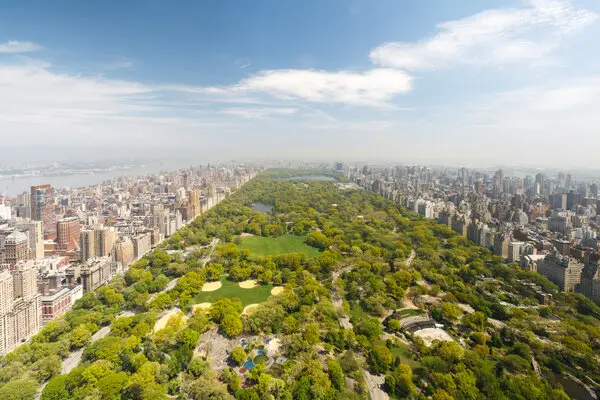Local Law 97 is the most ambitious initiative within 2019’s Climate Mobilization Act, one intended to change Manhattan’s commercial real estate and energy market forever. Going into effect Jan. 1, Local Law 97 requires “most buildings over 25,000 square feet will be required to meet new energy efficiency and greenhouse gas emissions limits by 2024, with stricter limits coming into effect in 2030.” Subsequently, the Local Law 97 PR battle has ensued, spilling out into the NYC and national media. With numerous proptech, real estate and utility software/hardware clients, FischTank PR has kept a close eye on headlines, including the following stories:
NYC Buildings Complying With Emissions Law Faster Than Expected | Bloomberg Law
“Pete Sikora, climate and inequality campaigns director at New York Communities for Change, said buildings that were very wasteful have the biggest opportunity to cut emissions through simple fixes such as insulating exposed heating pipes, tuning their boilers, operating their HVAC systems properly, or switching to LED light bulbs.
Aggarwala expressed dismay that many of the buildings that aren’t in compliance are in disadvantaged communities.
Fines under Local Law 97 could be ruinous to middle- and low-income tenants, because the costs may be passed down in the form of increased rents and other fees, according to Geoffrey Mazel, a board member and an attorney with Homeowners for a Stronger New York.
But Local Law 97 contains provisions for buildings that are making a good faith effort to comply, and City Hall under Mayor Eric Adams (D) is now developing rules on how those efforts will be assessed. Those draft regulations are expected within ‘a few weeks,’ Aggarwala said.”
New York Developers Rush to Reduce Emissions as Hefty Fines Loom | The New York Times
“The law zeros in on large buildings in New York, setting limits on their admissions. The city’s 1 million buildings generate nearly 70% of its carbon emissions, because much of the energy for the heating, cooling and lighting, comes from burning fossil fuels.
Real estate companies with large portfolios – and often staff devoted to sustainability initiatives – have generally been getting their carbon acts together, and many are on track to avoid crushing penalties in the near term. But mom-and-pop companies that own older buildings…have their backs against the wall.
City officials… have said they are sympathetic to struggling owners, and can waive or lower fines for those quotation good faith and quotation efforts Dash wiggle room that is enshrined and local law 97. The city is still drafting rules for applying the law and has hit pause on a financing program that would pay for the sorts of retrofitting that many buildings will need.”
The New York Times has given consistent coverage to Local Law 97 PR.
Compliance with Local Law 97 Is Outpacing Predictions | Habitat Magazine
“Here’s an inconvenient bit of news for the co-op and condo boards and other real estate interests seeking to portray Local Law 97 as draconian, punitive and impossible to meet: building owners, including co-op and condo boards, are cutting their carbon emissions and complying with the law much faster than the city expected.
Beginning in 2024, buildings larger than 25,000 square feet must reduce their carbon emissions under prescribed caps, or face stiff fines. The city estimated that 80% of the covered buildings already comply with the 2024 caps….But a preliminary review by the city’s Department of Buildings (DOB) shows that only 11% of New York’s buildings — about half of the projected 20% — are not currently on track to meet the requirements. And that 11% still has more than four months to make changes.”
CBS New York visits NYC’s first multi-family project with active geothermal system | CBS News
“Towering 26 stories over the playful skyline in Coney Island, a new development at 1515 Surf Ave. promises change to the neighborhood in more ways than one.
LCOR claims the development is going to be the first sustainable building of its kind in New York City. The underground wells, located hundreds of feet below, are expected to reduce the building’s carbon emissions by more than 60%.
Others, like local activist Angela Kravtchenko, are excited for the project, yet worry about the changing community…LCOR says the building is designed to withstand flooding and storms, and promises thousands of feet of amenities, on-site parking, and retail space.”
THE COSTS OF CHANGE: NYC co-op and condo owners join forces with big real estate to soften Local Law 97 | amNewYork
“The city’s landmark building emissions law, Local Law 97, is set to go into effect next year, and the complex rule-making process has set off a frenzy of lobbying activity aimed at influencing and potentially weakening the statute aiming to help combat climate change.
While most building owners will meet the 2024 requirements, older co-op buildings in particular will struggle to comply. Modern condo developments and office buildings are mostly in compliance.
Some city lawmakers have proposed delaying the implementation of the law by seven years so property owners, particularly co-op and condo owners, have more time to get into compliance.
But Sikora says the consequences of such a move would be dire, with the United Nations pressing members to undertake large-scale decarbonization and sustainability projects as the world approaches the “point of no return” on temperature increases.”
Time Is Running Out for Co-ops and Condos to Comply with Local Law 97 | Habitat Magazine
“Jessica Tusing, the director of compliance at Argo Real Estate, a Manhattan-based property management firm that oversees about 120 residential buildings across the city, tells amNY that the longer co-op and condo boards wait to comply with Local Law 97, the worse the financial repercussions will get.
Many co-op and condo boards strapped for cash are being advised to take out loans and apply for grants to pay for necessary retrofits. The city has established a free program, NYC Accelerator, dedicated to helping property owners find grants and loans to fund the upgrades. The loans, officials say, would provide building owners with the ability to spread the cost of the work over an extended period, with the energy savings from the upgrades helping offset the cost of the debt.”
Looming Climate Law Has Co-op and Condo Owners Fretting About Funds to Retrofit Buildings | The City
“Property owners with lower or fixed incomes are scrambling to fund renovations to comply with a city climate law that requires buildings to reduce their carbon emissions.
The law’s intent is to address climate change by forcing buildings — which are the city’s biggest polluters — to reduce carbon emissions with the goal of lowering them 40% citywide by 2030 and 80% by 2050.
And while he also noted that the Adams administration “does not want to create a lot of financial distress” and “is certainly on the side of figuring out how compliance can be as painless as possible,” that leniency, too, comes with its limitations.”
***Guest post from FischTank PR interns: Veronica Riga and Bianca Roque ***
Want to learn more Local Law 97 PR, as well as real estate and proptech communications?
FischTank PR has worked with numerous clients at the intersection of climate tech as well as real estate and construction – or what many refer to as proptech. Please contact us at letswork@fischtankpr.com to learn more about our media relations and corporate communications services.




